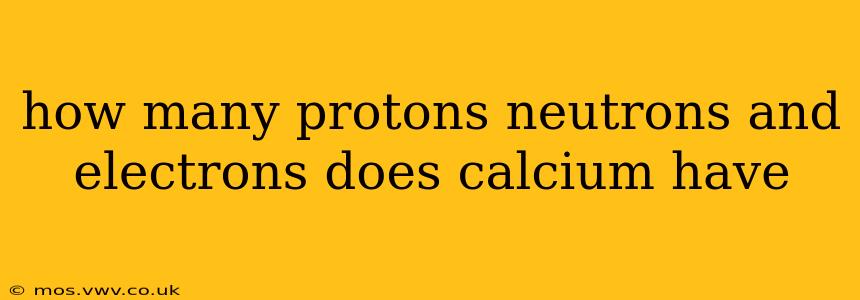How Many Protons, Neutrons, and Electrons Does Calcium Have?
Calcium, a vital element for human health and numerous industrial applications, has a specific atomic structure defining its properties. Understanding the number of protons, neutrons, and electrons in a calcium atom is fundamental to comprehending its behavior and role in various contexts. Let's delve into the details.
Understanding Atomic Structure:
Before we get to the specifics of calcium, it's crucial to grasp the basics of atomic structure. An atom consists of three primary subatomic particles:
- Protons: Positively charged particles found in the atom's nucleus. The number of protons determines the element's atomic number and its identity on the periodic table.
- Neutrons: Neutral particles (no charge) also residing in the nucleus. Along with protons, they contribute to the atom's mass.
- Electrons: Negatively charged particles orbiting the nucleus in shells or energy levels. The number of electrons usually equals the number of protons in a neutral atom.
Calcium's Atomic Composition:
Calcium (Ca) has an atomic number of 20. This means that:
- Protons: A neutral calcium atom possesses 20 protons. This is the defining characteristic of calcium; any atom with 20 protons is a calcium atom.
Now, let's consider neutrons. The number of neutrons can vary for the same element, leading to different isotopes. The most common isotope of calcium is Calcium-40 (⁴⁰Ca).
- Neutrons (in ⁴⁰Ca): Calcium-40 has a mass number of 40. The mass number is the sum of protons and neutrons. Therefore, ⁴⁰Ca has 40 - 20 = 20 neutrons.
Finally, let's address electrons:
- Electrons: In a neutral calcium atom, the number of electrons equals the number of protons. Thus, a neutral calcium atom has 20 electrons.
What are the different isotopes of calcium?
Calcium has several stable isotopes, meaning they don't readily decay into other elements. These include Calcium-40 (⁴⁰Ca), Calcium-42 (⁴²Ca), Calcium-43 (⁴³Ca), Calcium-44 (⁴⁴Ca), and Calcium-46 (⁴⁶Ca). Each isotope has the same number of protons (20) but differs in the number of neutrons, resulting in variations in their mass number. The number of electrons remains the same (20) in their neutral states.
How does the number of neutrons affect calcium's properties?
While the number of protons defines the element, the number of neutrons influences its mass and can impact its stability. Different isotopes of calcium might exhibit slightly different properties, though the differences are often subtle in their chemical behavior. However, these variations can be significant in nuclear physics and applications.
What is the role of calcium in the human body?
Calcium is essential for numerous bodily functions. It plays a crucial role in building and maintaining strong bones and teeth, muscle contraction, nerve impulse transmission, blood clotting, and regulating heart rhythm. Maintaining adequate calcium intake through diet or supplementation is vital for overall health.
In summary, a neutral calcium atom (specifically the most common isotope, ⁴⁰Ca) has 20 protons, 20 neutrons, and 20 electrons. Understanding this atomic composition is key to understanding calcium's properties and its crucial role in various fields, from biology to materials science.
